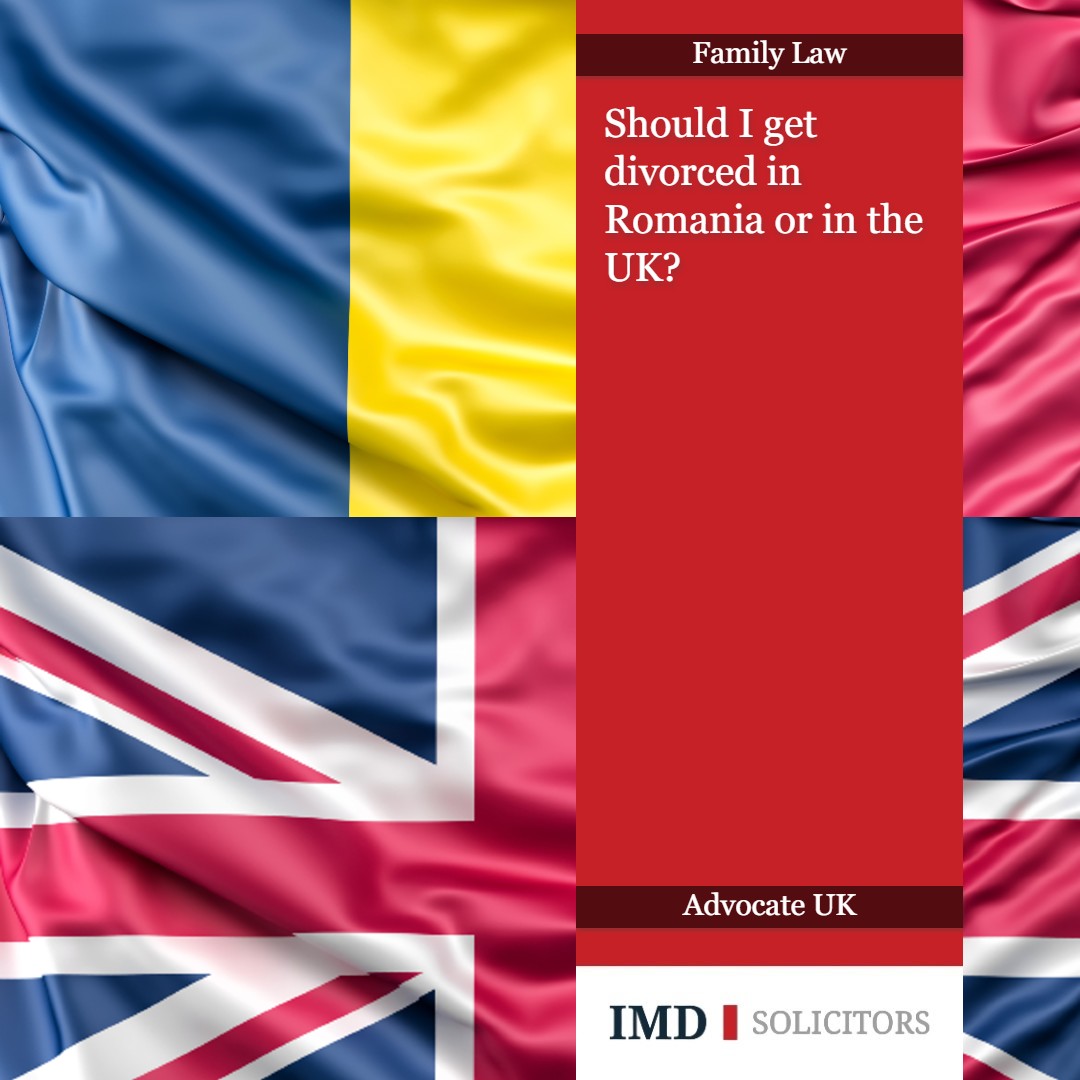
According to romania-insider.com, Romanian nationals make the fourth largest group of foreign-born residents in England & Wales, after the Indian, Polish and Pakistani. We are regularly contacted by individuals married to Romanian nationals or Romanian nationals themselves looking for advice and representation in relation to their family matters.
Sadly, most enquiries relate to divorce and the most frequent dilemma our clients have is where to initiate divorce proceedings: in the UK or in Romania? Below we present a brief explanation of the main differences between the two procedures.
The issue of appropriate jurisdiction to proceed with the divorce may depend on various factors, including residency status and specific circumstances.
However, there are several criteria that apply to all cases. Please remember that the fact that the marriage took place in Romania, or as a matter of fact in any other country, does not prevent from issuing divorce proceedings in the UK.
Following Brexit, it is possible for divorce proceedings to commence in the UK even if only one party to the marriage is domiciled there.
Starting from 1 January 2021, the ‘first in time’ rule is no longer the deciding factor when one spouse files for divorce in one jurisdiction and the other in a different one. The deciding factor will now be ‘closest connection’, and to establish it, the UK courts will consider various aspects such as:
In the UK, if both you and your spouse agree to the divorce, the procedure should conclude within 6 months. If your spouse is not cooperating, this may be delayed longer as additional work will be required to progress the case.
In Romania, if both you and your spouse agree to the divorce, the procedure should conclude between 2 months (if you opt for a notary procedure) and 12 months (if you decide to go to court). Like the UK, if your spouse is not cooperating, this may be delayed as additional work will be required to progress the case.
No, you don’t have to go to court for your divorce in the UK, unless your spouse contests the divorce based on the two available grounds: the jurisdiction of the UK court or the marriage having already legally ended.
Going to court is not mandatory in Romania either. However, most people choose this option for the following reasons:
In April 2022, the UK introduced the No-Fault divorce which has removed the blame game from the divorce procedure and has simplified the application for divorce. You are currently only required to confirm on your application that your marriage has irretrievably broken down.
The same rules apply in Romania.
In the UK, the divorce and finances of the marriage are separate, independent matters. As such, finalising your divorce will not sever the financial ties between you and your spouse. This poses a significant risk, since it leaves the gate open for either of you to make a financial claim at a later stage, even if your divorce was finalised. It is therefore always recommended to solve any financial issues between you and your spouse before you apply for your Final Order of divorce.
Similarly, the divorce and finances of the marriage are also separate, independent procedures in Romanian jurisdiction. A financial claim can be made by either of the spouses at any time, before or after the divorce (there is no statute of limitations that applies to financial claims).
It is important to consider where the financial matter should be progressed before a decision about where to issue the divorce is made.
The courts in Romania will make no orders in respect of the property in the UK. If there are properties in the UK, we would recommend that legal advice is sought before deciding to start divorce proceedings.
If the divorce starts abroad, but there are properties in the UK, the court in the UK will ask for additional application to allow proceedings for financial division of assets following overseas divorce. This will take time and generate additional and unnecessary costs.
In principle, they cannot do so neither in the UK nor Romania. Even if your spouse is not cooperating, there are alternative routes available to conclude the divorce. If, however, your spouse is formally contesting the divorce based on one of the grounds listed above, then the matter will need to be assessed further and we recommend that you seek legal advice.
Provided that you are required to use the divorce order from the UK in Romania, you will need to register the documents with the authorities in Romania first. This is where our firm cooperates with partners in Romania to ensure a swift and smooth process for our clients.
In each case the answer may be different, and it will very much depend on the circumstances. Considering where to issue divorce proceedings should not be done without considering financial and children matters. There will be instances where assets are located both in the UK and Romania, or in addition in other jurisdictions, and we will be able to provide a comprehensive advice in those cases. With assets located in the UK and in other jurisdictions it is paramount to consider the courts’ approach in each or in main jurisdictions before a decision where to proceed is made. It is important to focus on what is intended to be achieved and to know how judges approach the division of assets in the jurisdictions concerned.
Most importantly, the division of assets or a consent order that puts an end to the parties’ financial obligations following from the marriage, should not be ignored or forgotten when dealing with the divorce.
This article is for general information only and does not constitute legal or professional advice. Please note that the law may have changed since this article was published.